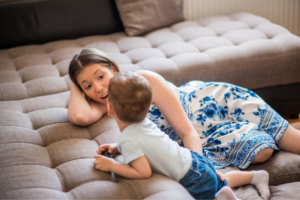Discipline: what is it and how do I do it?

“Discipline” actually means “teaching.” Teaching is about setting goals for learning, planning a practical approach, and finding solutions that work. While parenting children, parents are often learning themselves. Finding the facts about what we know works with discipline is a great first step.
“Positive discipline” is respectful of the child. It is nonviolent and includes a process that helps children succeed, gives them information, and supports their growth.
Discipline is a way of teaching children how to:
- solve problems
- think for themselves
- get along with others
- resolve conflict
- do the right thing (even when you are not there)
Discipline is not doing something to children; it is working with them appropriately to their developmental level. Understanding how children think and feel is important for positive discipline. Discipline shows children:
- what they have done wrong
- gives them ownership of the problem (appropriate to their age and development)
- gives them options for solving the problem
- shows them respect
- leaves their dignity intact
How do I positively discipline my child?
- Provide warmth and structure
- Offer praise and affection regularly
- Consider what your child is thinking and how they are feeling
- Talk to your child, so they know what the rules and limits are
- Plan transitions from one activity to the next
- Offer limited and realistic choices that you can accept
- Know what behaviours to ignore
- Accept that they will make mistakes
- Be a role model
Let your child know what you expect. Remind them regularly about rules and limits. A good limit:
- is appropriate to your child’s age and stage of development
- helps your child learn self-control
- protects your child and others
- is explained using simple language
- is used consistently, respectfully, and kindly
Learning how to manage common challenging behaviours can help as you teach young children using positive discipline.
Services related to this information:
- Contact your Public Health Nurse or health-care provider to discuss your child’s behaviour.
- Contact your local Family Resource Centre for parenting programs and support.
- Strongest Families Children and Youth Programs
Free skill-based educational programs for children, youth, adults, and families seeking help to improve mental health and well-being.- 811 HealthLine (Newfoundland & Labrador) – Call 811 or 1-888-709-2929 / TTY 1-888-709-3555

